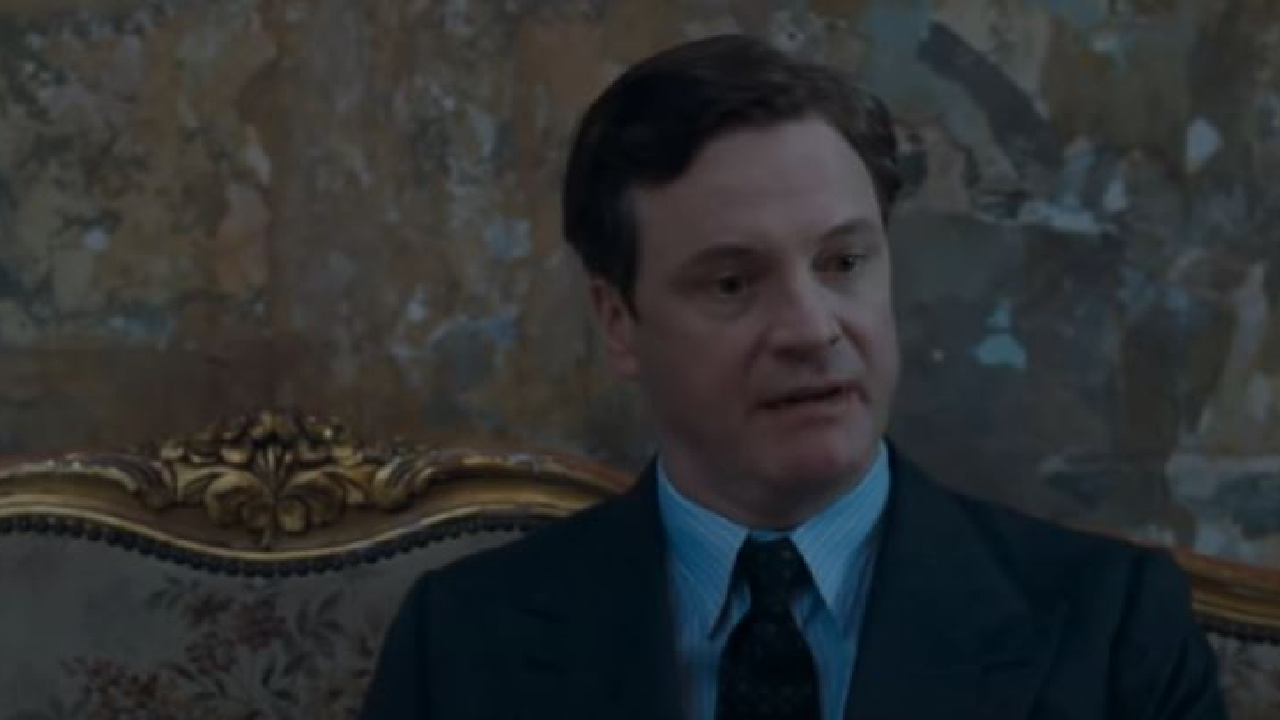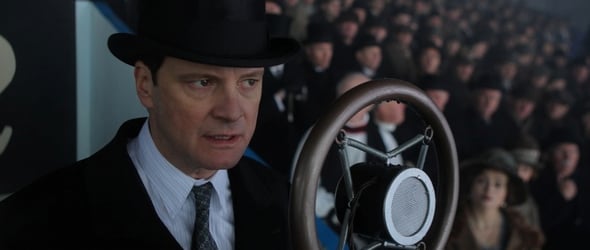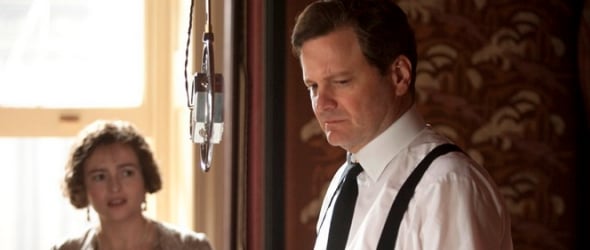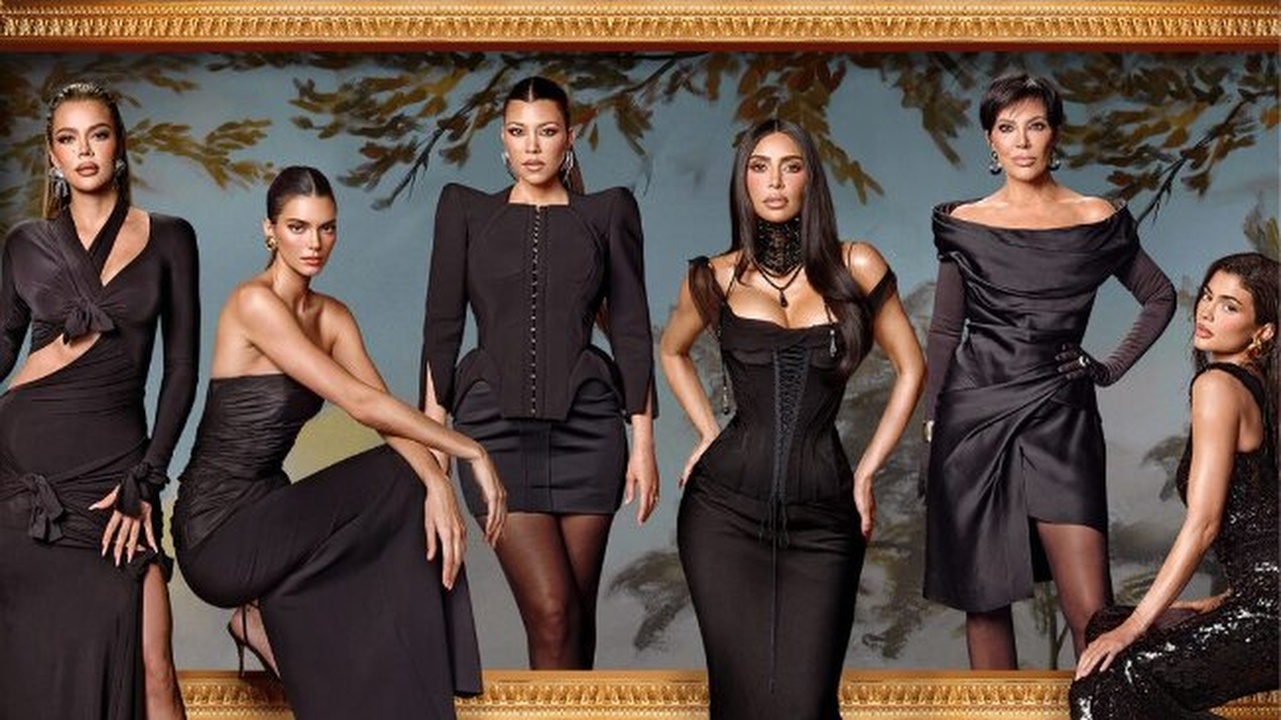Interview: Colin Firth Finds His Royal Voice In The King's Speech

The King's Speech is the kind of movie that has Oscar written all over it before you even know the story-- simply say "Colin Firth, Geoffrey Rush, Helena Bonham Carter in a period movie about royalty" and you can practically imagine the statues lining up on the shelves. Luckily for all of us, though, The King's Speech is far more than just your average Oscar bait, but a truly remarkable, human, funny and moving story about England's King George VI, who was forced to overcome his stammer and general shyness when his older brother David abdicated the throne just as England was on the brink of entering World War II.
Firth plays King George VI--known to his family and unconventional speech therapist Lionel Logue (Rush) as Bertie-- as a man bottled up and frustrated after a lifetime of brutal stammering, but also deeply committed to his family, his duty as a royal and to the country he must lead. It's a tremendous performance, the kind of thing that gets awards buzz not because it's obvious, but because it simply floors you-- not unlike Firth's nominated performance in last year's A Single Man, although a completely different character. A few weeks ago I talked to Firth in a roundtable interview about the pressure of playing a royal, coming to understand the strange character he'd been given, and how things like Oscar buzz and even the movie's controversial R-rating affect how a small movie like this one might perform with audiences. The King's Speech is out in limited release now and will be expanding wider as the month goes on. You can learn more in my 5-star review of the film, and check out the whole interview below.
Was there anyone in the royal family you wished you could have talked to when you were preparing this role?
Well, yes, George VI. So much is a mystery, and the flow of information out of the palace is non-existent. If you play a role you want to familiarize yourself with that person's world. If I were playing an airline pilot or a doctor, I'd probably want to hang out with a doctor or an airplane pilot for a while, ask some questions. You don't get to hang out the kings. They don't help consult on movies. So your resources are by necessity secondary. I started from knowing nothing, absolutely nothing about this family at all. I have met Prince Charles. I didn't find anything out about him, because this man's job is to be on duty all the time. You get the graciousness, he's very good at it, he has a private secretary marshaling him to the next person to spend a few seconds with them. I guess I could learn from that just watching how everyone behaved around him. There were a few people who I thought were anti-monarchist republican hippies-- republican in the small-R, anti-monarchy version of the word-- who suddenly became extremely respectful, and that was telling. I suddenly realized, that must be how you see the human race. If everyone's like that, that's how the world is for you.
King George VI shows a profound sense of duty, and most people would certainly say the present Queen feels the same duty.
That's borne out by what people said about them, and what was written about them. That was certainly their father's view. David, i guess, was the loose cannon. He was Prince Charming to many people, he was incredibly good-looking, he was dashing. I suppose a mischievous air that appealed to people. The soldiers loved him. Bertie was in the shadows and considered the dull one. He was mistakenly thought to be dull-witted, even by modern biographers. If you read his letters or quotes, there's no way. He has an elegance of language; he's pithy and ironic. I think he was misjudged because was so, I think, debilitated by his stammer and by his upbringing. He definitely, I think, had a certain humility and humanity about him. When the abdication crisis was pending, when David was trying to make the decision, Bertie was desperately trying to put out the fire and look out for his brother.

I was surprised to see King George VI's rages, how everything would be fine and then he would fly off the handle.
Your Daily Blend of Entertainment News
Well because I didn't know anything about him, everything was a surprise. I didn't know he had this huge temper, but he did. So did his father and so did his grandfather apparently. Whether you put it down to running in the family, or the fact that all your channels of communication are blocked and you're a smart person, and if you do manage to get something out nobody wants to hear it anyway. Even the outlet of writing is knocked out of you because you're left-handed. It's a pretty explosive cocktail, if you bottle up a person like that. I would say his rages are completely understandable, and they were an issue.
Can you talk about developing the stammer?
We had a very intense three-week rehearsal period. We were scheduled to have two, but Geoffrey came over a week early to start the work, because there was so much to deal with and resolve. I've twice played a character with a stammer, but it was different every time. None of that helps. It's a different guy, he has different issues he has a different way of dealing with things because he was a different person. None of it helped, we had to start again. We had to find a way to make this sound authentic, and have it be painful. the audience had to experienced the pain and the discomfort. That had to not be compromised. But if it was inauthentic it would be catastrophe. If it was too much, too painful, the risk is it alienates people. And the film has to have a pace to it. There's a technical thing to be judged there. This has to seem like it's taking forever, but it can't actually take forever. And there's also some humor. Using those decisions, having it feel like instinct. It's a tricky business to solve, and how we solved it, I'm not sure. It became very visceral. I got headaches. I thought, wow, if this person really had to fight like that to talk, that's what they're going through. They're probably having to fix their neck and back muscles on a regular basis.

How do you feel about the R-rating?
I don't need to rail about it, because I haven't found anyone who disagrees-- I think there's a lot of harmony out there on this one. And I've got small kids, so I don't think this is a non-issue. It's not, "Bring your kids to hear the F-word!" I don't even need to rehearse the argument with the inconsistency with the violence/torture thing. [The MPAA ruling system] got out of kilter, and they've probably been painted into a corner somehow on this issue. I think there's going to have to be a bit of a rethink on how the standards are judged. It's interesting, this case, it's a very special case.
There's another thing that it does't do, it doesn't use that kind of language casually. I hate it when my kids hear that. I have a 7-year-old, and I take him to football games, and the stuff you hear there would make this sound like The Sound of Music. I wrestle with taking him, because it's such an ugly sound. He hears them, and I don't like it, and I don't want to deny him football, and that's part of the world. This is a case where the guy would never use them casually, and he's actually quite sheepish about it. He has his big moment and then he puts it all back in the box and feels rather silly and rather wishes he hadn't. If you can make an exception this is definitely one case for that.
Are the Oscars a necessary evil for a movie like this?
I don't know if it's necessary. It can help a small movie enormously. It can be the difference between a small movie getting noticed or not. Something like A Single Man it was tiny, it was financed by one guy, we all lost money doing it. It was the difference between something that might have been a niche movie and it really got out there, and that was all about festivals and nominations. I think this is in a fairly similar category. What to us felt like a small movie, what would have been a way off-stream movie, is suddenly very successful and very mainstream. And that's because of the response out of these festivals. If people are talking about awards, it's because of that.
I loved your speech at the BAFTAs last year. Had you prepared that?
No actually-- I had written it off because it was a whole season of listening to Jeff Bridges' name being read out, and that took the pressure off. When it kept not happening, I thought, we don't have to do this this season, that's fine. Actually it made it kind of fun. It just was really a series of parties. It's doubt that makes you bite your fingernails, and there just wasn't ay. BAFTA hit me like a bolt.
Staff Writer at CinemaBlend

